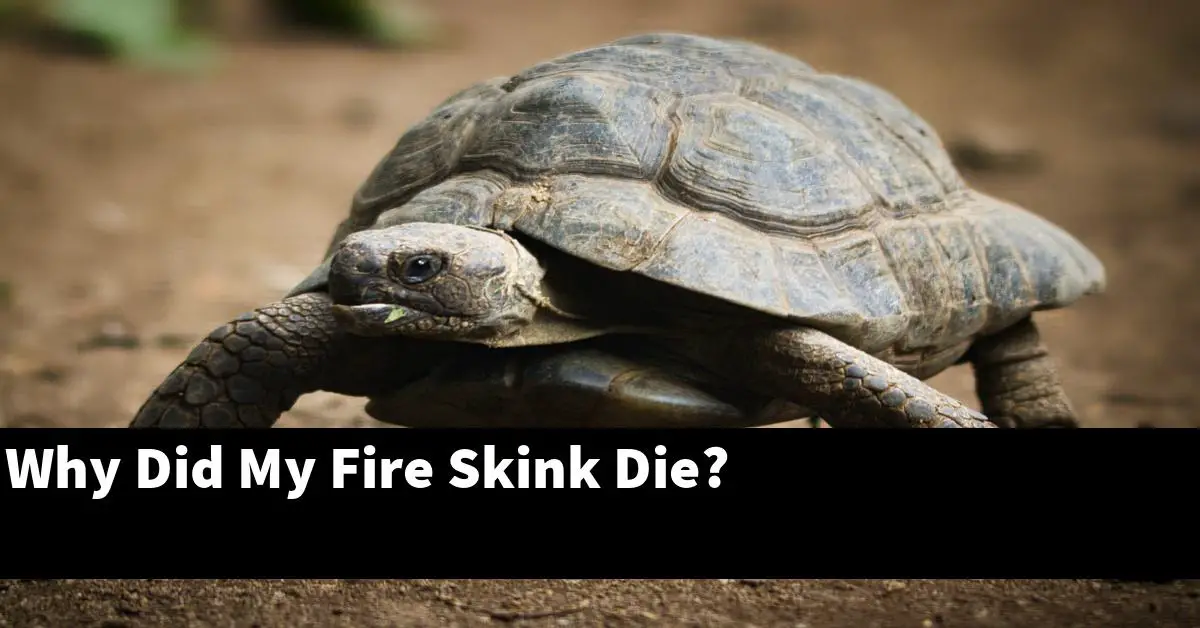If you’re wondering why your fire skink died, you’re not alone. In this blog post, we’ll take a look at the most common causes of death in fire skinks and what you can do to prevent it in the future.
Table of Contents
Why did my fire skink die?
When a fire skink dies, it is usually because of one of two things: either they were not cared for properly, or they had a genetic defect that made them more susceptible to disease.
If they were not cared for properly, it is likely that they did not have the right diet or environment. Fire skinks are native to Africa, and so they need a warm, dry climate to thrive. If they are kept in an enclosure that is too humid or too cold, they will become stressed and more susceptible to disease.
They also need a diet that is high in protein, as they are very active lizards. If they are not given enough food, or if their diet is not balanced, they can become sick and die.
Sometimes, fire skinks will die even if they are given the best care possible. This is usually because they have a genetic defect that makes them more susceptible to disease.
Some fire skinks are born with weakened immune systems, for example, which means that they are more likely to get sick and die even if they are kept in the best conditions.
How can I prevent my fire skink from dying?
If you are concerned about your fire skink dying, there are some steps you can take to prevent this from happening.
- First, make sure that your skink has a proper diet and access to clean water.
- Secondly, provide your skink with a suitable habitat that has the correct temperature and humidity levels.
- Lastly, take your skink to the vet for regular check-ups to ensure that it is healthy.
By taking these precautions, you can help to ensure that your fire skink will have a long and healthy life.
What are the common causes of death in fire skinks?
There are many potential causes of death in fire skinks, as these lizards are delicate creatures.
Some of the most common include:
- Dehydration: Fire skinks require high humidity levels to stay hydrated, and if they do not have access to a water source, they can quickly become dehydrated and die.
- starvation: Fire skinks need a diet that is high in protein in order to survive. If they do not have access to food, they will eventually starve to death.
- Injury: Fire skinks are fragile creatures, and even a small injury can be fatal.
- Disease: Fire skinks are susceptible to many different diseases, some of which can be deadly.
How often should I feed my fire skink?
Ideally, you should feed your fire skink small meals 2-3 times per week.
Are fire skinks smart?
There is no scientific consensus on whether fire skinks are smart, but there are some indications that they may be more intelligent than other lizards.
For example, fire skinks have been observed using tools, such as sticks, to help them catch prey. They also seem to be good at problem-solving, such as finding ways to escape from captivity. Additionally, fire skinks have been shown to have good memory recall, which suggests they are able to remember and learn from past experiences.
Overall, while there is no definitive proof that fire skinks are smart, there is some evidence to suggest they may be more intelligent than other lizard species.
What should I feed my fire skink?
There are a variety of things you can feed your fire skink to ensure it remains healthy and happy.
Some good options include:
- Insects such as crickets, mealworms, or waxworms
- Small lizards or pinkie mice
- Commercial lizard food pellets
You should avoid feeding your fire skink anything too large or that it can’t easily digest. This can lead to health problems or even death. Always consult with a veterinarian if you have any questions about what to feed your fire skink.
Do fire skinks drop their tails?
Yes, fire skinks do drop their tails. When they are threatened, they will quickly shed their tail in order to escape. The tail will grow back, but it will be shorter and not as brightly colored as the original.
Summary
It is always a tragedy when a beloved pet dies, and even more so when the cause is unknown. In the case of a fire skink, there are a few potential causes of death that should be considered.
- First, fire skinks are native to Africa and require a warm, humid environment to thrive. If the skink’s enclosure is not properly heated and humidified, it can lead to a slow and painful death.
- Second, fire skinks are very delicate creatures and can easily succumb to stress or illness. If your skink was not eating or acting normally in the days leading up to its death, this may be the cause.
- Finally, fire skinks are also susceptible to a number of parasites and diseases that can be deadly if left untreated.
f you are unsure of what caused your fire skink’s death, it is best to consult with a veterinarian or reptile specialist to get a definitive answer.

